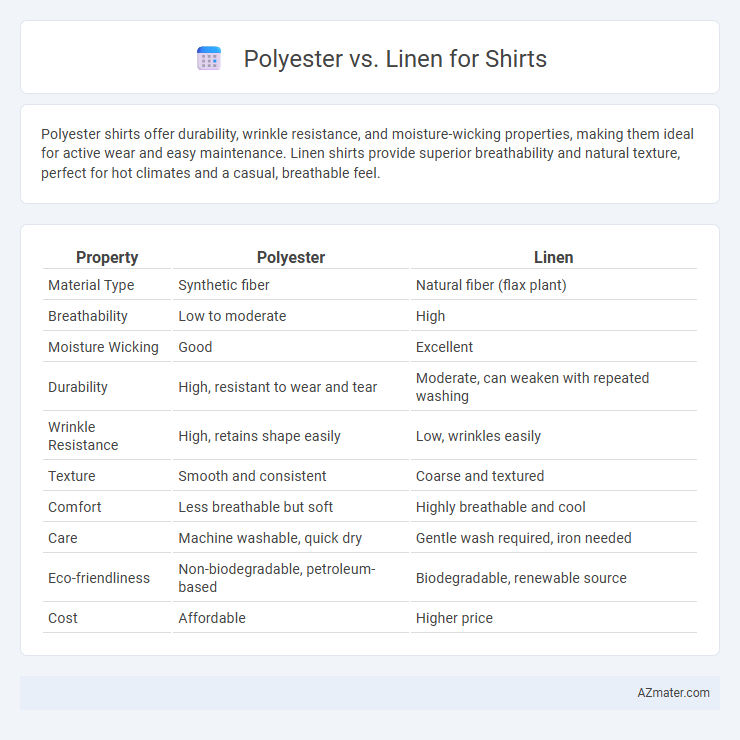Polyester shirts offer durability, wrinkle resistance, and moisture-wicking properties, making them ideal for active wear and easy maintenance. Linen shirts provide superior breathability and natural texture, perfect for hot climates and a casual, breathable feel.
Table of Comparison
| Property | Polyester | Linen |
|---|---|---|
| Material Type | Synthetic fiber | Natural fiber (flax plant) |
| Breathability | Low to moderate | High |
| Moisture Wicking | Good | Excellent |
| Durability | High, resistant to wear and tear | Moderate, can weaken with repeated washing |
| Wrinkle Resistance | High, retains shape easily | Low, wrinkles easily |
| Texture | Smooth and consistent | Coarse and textured |
| Comfort | Less breathable but soft | Highly breathable and cool |
| Care | Machine washable, quick dry | Gentle wash required, iron needed |
| Eco-friendliness | Non-biodegradable, petroleum-based | Biodegradable, renewable source |
| Cost | Affordable | Higher price |
Introduction: Polyester vs Linen Shirts
Polyester shirts offer durability, wrinkle resistance, and moisture-wicking properties, making them ideal for active wear and travel. Linen shirts provide superior breathability and a natural, lightweight feel, perfect for hot climates and casual settings. Choosing between polyester and linen depends on priorities like comfort, maintenance, and climate suitability.
Fabric Composition and Characteristics
Polyester shirts feature synthetic fibers derived from petroleum, offering durability, wrinkle resistance, and quick-drying properties, making them ideal for activewear and travel. Linen shirts, made from flax plant fibers, provide excellent breathability, moisture-wicking, and a natural textured feel, suited for warm climates and casual wear. While polyester resists shrinking and fading, linen tends to soften with washing but requires more delicate care to maintain its shape.
Breathability and Comfort Comparison
Linen shirts excel in breathability due to their natural fibers and loose weave, allowing superior airflow and moisture-wicking, ideal for hot climates. Polyester shirts, made from synthetic fibers, trap heat and moisture, often causing discomfort and reduced air circulation. Comfort-wise, linen feels cooler and softer on the skin, while polyester tends to feel less breathable and can retain odors after prolonged wear.
Moisture-Wicking and Sweat Management
Polyester excels in moisture-wicking and sweat management due to its synthetic fibers that quickly draw moisture away from the skin, keeping the wearer dry and comfortable during intense activities. Linen, made from natural flax fibers, offers moderate breathability but tends to absorb sweat rather than wick it away, which can lead to a damp feel in hot conditions. For performance shirts prioritizing effective moisture control, polyester is generally the superior choice over linen.
Durability and Longevity
Polyester shirts exhibit exceptional durability due to their resistance to shrinking, stretching, and wrinkles, making them ideal for everyday wear. Linen, while breathable and highly comfortable, tends to wear out faster because it is prone to fiber breakage and creasing over time. For long-lasting garments, polyester offers greater longevity with less maintenance compared to the more delicate natural fibers of linen.
Maintenance and Easy Care
Polyester shirts offer superior easy-care benefits due to their wrinkle resistance and quick-drying properties, requiring minimal ironing and maintenance. Linen, while breathable and natural, demands more careful handling with gentle washing and frequent ironing to maintain its crisp texture and prevent shrinkage. Choosing polyester simplifies daily upkeep, whereas linen requires a commitment to more diligent care routines.
Environmental Impact and Sustainability
Polyester, derived from petrochemicals, has a higher carbon footprint and contributes to microplastic pollution compared to linen, which is made from flax fibers and is biodegradable. Linen requires less water and fewer pesticides during cultivation, making it more environmentally sustainable than polyester. The biodegradability and lower resource intensity of linen position it as a greener choice for eco-conscious shirt production.
Style and Appearance Differences
Polyester shirts offer a smooth, shiny finish with vibrant color retention, making them ideal for a polished, modern look. Linen shirts provide a natural, textured appearance with a matte finish that exudes casual elegance and breathability. The crisp, structured look of polyester contrasts with linen's relaxed, slightly wrinkled aesthetic, influencing overall style perception and outfit versatility.
Cost and Affordability
Polyester shirts typically offer greater affordability with prices often ranging between $10 to $30, making them a budget-friendly choice. Linen shirts generally cost more, usually between $40 to $100 or higher, due to the natural fibers and complex manufacturing process. The lower production costs and synthetic nature of polyester contribute to its widespread use in cost-conscious apparel markets.
Which Is Better: Polyester or Linen Shirt?
Polyester shirts offer durability, wrinkle resistance, and moisture-wicking properties, making them ideal for active wear and low-maintenance use. Linen shirts provide superior breathability, natural fiber softness, and a stylish, lightweight feel, perfect for warm climates and casual elegance. Choosing between polyester and linen depends on preferences for comfort, climate suitability, and ease of care.

Infographic: Polyester vs Linen for Shirt
 azmater.com
azmater.com